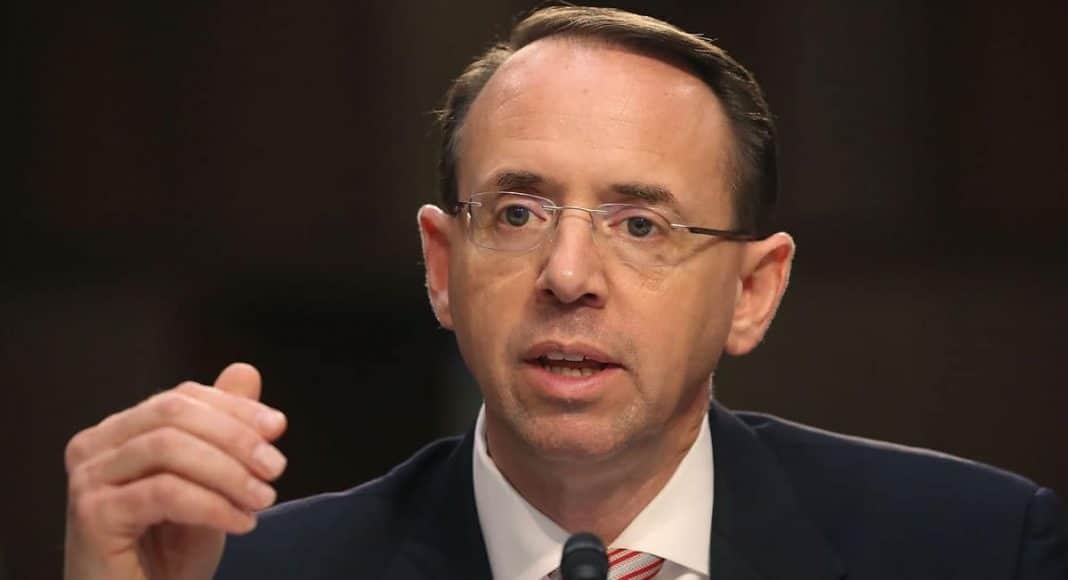Although Deputy Attorney General Rod Rosenstein previously said that the Justice Department was not preparing to renew the War on Drugs, he admitted to the Senate Appropriations committee earlier this week that the United States would likely see some changes in the way the federal government deals with areas of legal marijuana.
During the hearing, Senator Lisa Murkowski of Alaska grilled Rosenstein over the tension that exists between state and federal marijuana laws. Ultimately, the senator, a Republican, was trying to get Jeff Sessions’ second in command to elaborate on whether the Justice Department plans to crackdown on legal weed or allow it to continue as it has for the past several years.
-
Related Story: Jeff Sessions And Marijuana: The Only Thing You Need To Know
“Where are we headed with marijuana?” Murkowski asked.
“We do have a conflict between federal law and the law in some states,” Rosenstein replied. “It’s a difficult issue for parents like me, who have to provide guidance to our kids… I’ve talked to Chuck Rosenberg, the administrator of the DEA and we follow the law and the science. And from a legal and scientific perspective, marijuana is an unlawful drug. It’s properly scheduled under Schedule I. And therefore we have this conflict.”
The Cole Memo
The Deputy Attorney General then went on to explain that the Cole Memo, which was issued by former President Obama’s Justice Department back in 2013, giving states the freedom to experiment with the legalization of marijuana, might be on borrowed time.
“Jim Cole tried to deal with it in that memorandum and at the moment that memorandum is still in effect,” he said. “Maybe there will be changes to it in the future but we’re still operating under that policy which is an effort to balance the conflicting interests with regard to marijuana.
“I can assure you that is going to be a high priority for me as the U.S. Attorneys come on board to talk about how to deal with that challenge in the states that have legalized or decriminalized marijuana, whether it be for recreational or medical use,” he added.
It wasn’t long until Rosenstein was asked about whether the Justice Department was working on an update to the Cole Memo or if it was going to eliminate the guidelines altogether.
Related Story: Jeff Sessions’ Medical Marijuana Memo Is Not What America Needs
“Does the Department plan to update or rescind the memo?” Representative Derek Kilmer of Washington state asked.
“I do not have an update,” Rosenstein replied. “I can tell you, it’s a very complicated issue for us. Under federal law as passed by the Congress, and given the science concerning marijuana, it’s a Schedule I controlled substance. That’s a decision I’ve talked with (DEA) Administrator Rosenberg about. Some states have taken a different approach and legalized or decriminalized marijuana for medical use and in some cases recreational use.”
“The question of whether it’s legal under federal law is resolved because Congress has passed a law — it’s illegal,” he continued. “Scientists have found that there’s no accepted medical use for it. Cole made an effort to examine the issue and find a way forward for the department where we could continue with our obligation to enforce federal law and minimize the intrusion on states that were attempting to follow a different path.”
What’s Next?
On Monday, it was revealed that Attorney General Jeff Sessions has been trying to persuade Congress to abandon the temporary medical marijuana protections known as the Rohrabacher-Farr amendment. This rider, which has been tucked inside a federal spending bill for the past three years, is the only provision stopping Sessions and his goons over at the DEA from launching a savage crackdown on the cannabis industry.
“I believe it would be unwise for Congress to restrict the discretion of the Department to fund particular prosecutions, particularly in the midst of an historic drug epidemic and potentially long-term uptick in violent crime,” Sessions wrote. “The Department must be in a position to use all laws available to combat the transnational drug organizations and dangerous drug traffickers who threaten American lives.”
Although Rosenstein concluded his testimony by saying, “For the moment the Cole memo remains our policy…I’m not aware of any proposal to change it,” marijuana advocates believe there is cause for concern.
“Deputy Attorney General Rod Rosenstein is implying that the DOJ under Jeff Sessions and the Trump Administration is pursuing a path to undermine legal state medical marijuana programs,” Justin Strekal, Political Director for NORML, told The Fresh Toast in a statement.
“With 30 states choosing to put patients first by allowing those suffering to make their healthcare decisions under the supervision of their doctors, it is absurd that this administration would make such veiled threats,” he added. “Last time I checked, neither Rosenstein, Sessions, nor President Trump are doctors and their zeal to threaten those who are sick is disturbing.”


